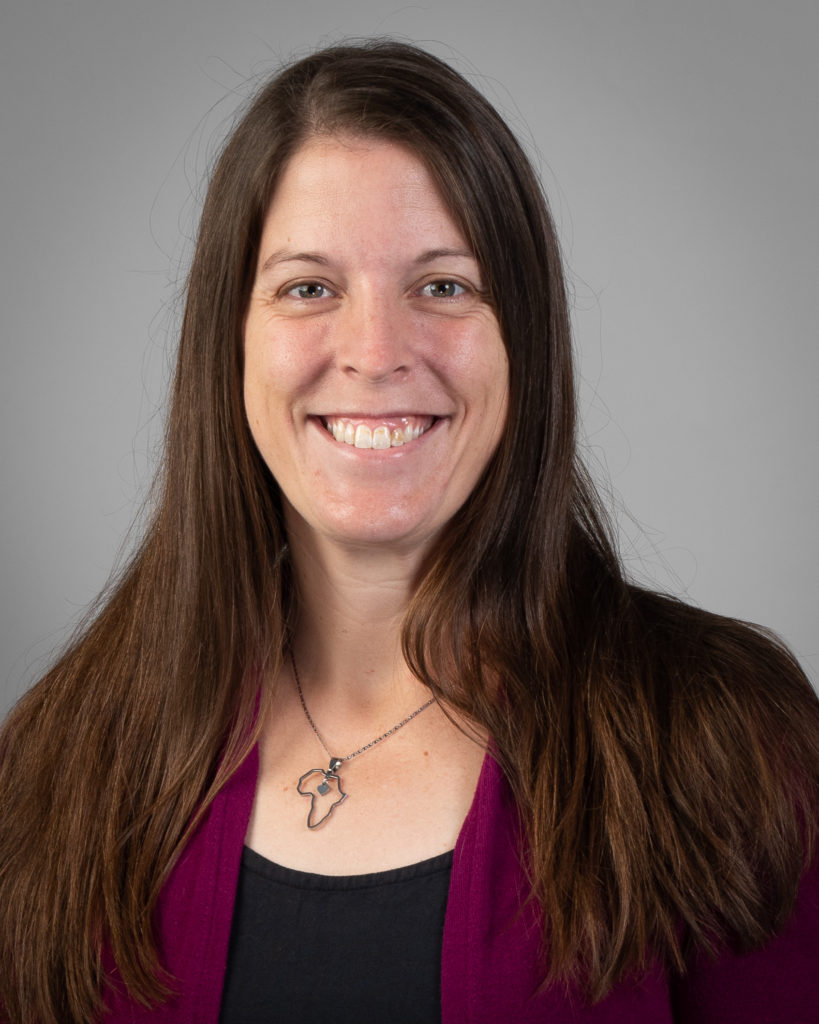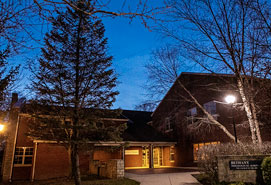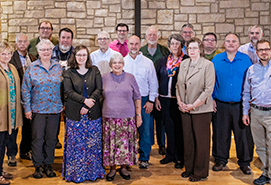At Home in Nigeria

Sharon Flaten grew up in Bridgewater, Virginia, but as a kid, Nigeria was all around her.
“There were wooden tables, trunks, and tie-dyed tablecloths my parents had brought from Nigeria,” she recalls. Her mother, the late Janet Flory Flaten, a music teacher, had a collection of Nigerian instruments — including percussion instruments made from gourds and piano-like devices made from reeds — which she would bring to Sharon’s school whenever there was an “international day.”
“As long as I can remember, I knew where Nigeria was, and I wanted to go there.”
Her mother and father (Dale Flaten) had met while teaching at Hillcrest School in Jos. Each was the child of missionaries. Janet’s parents ministered in China and India, while Dale’s parents served in Cameroon.
As a young adult, Flaten participated in work camps in Haiti and Puerto Rico, and after college, she joined Brethren Volunteer Service, which eventually led to her first trip to Nigeria in 2009. That four-week experience was transformative.
“I fell in love with the hospitality,” she says. Flaten recalls that during the trip, she had the opportunity to do two homestays. One stay was with a family with a large house in Maiduguri, a city in northeastern Nigeria, which in subsequent years has become dangerous to travel to. The other stay was in Lassa, where she stayed with a single woman living in one room who had little but offered her guest everything.
“The two homes were quite different from one another, but in both cases, I was greeted with such a sense of welcome and hospitality,” she says. “I wanted to figure out how to do that myself.”
Flaten, now a third-year Master of Divinity student at Bethany, now considers Nigeria her home. From March 2019 to July 2021, she lived in Jos, where she has served as a liaison to current and future Bethany students while completing her own seminary studies. While studying and living in Jos, she had the opportunity to preach at a local church, with a fellow student serving as translator. She completed a ministry placement with Threads and Light — an organization that provides support and training to widows to help them gain sewing skills that they can use to support their families.
“People who know me know that I’m a doer. I always want to pitch in and help,” says Flaten. “Working with Threads and Light was a different experience, because I don’t sew, and my life experiences are very different than the women the organization serves. I learned how to just be present with those women.”
Flaten has returned to Nigeria and live there long term — helping students and supporting the mission of the Seminary. She feels God moving in her, and her connection to Jos is deepening. After her mother’s death, for instance, she was able to plant a memorial garden in the courtyard of a building where her mother had lived as a young teacher. It is another way that she is making a home far away from where she grew up, but exactly where she has long felt drawn.
“My vision is to stay and focus on representing Bethany in the admissions process and to provide student support,” she says. “The responses I hear from Nigerian students are that they are excited about this program, and I know that Bethany would benefit from having someone in Jos who’s familiar with the seminary, understands the needs of students, and who has firsthand knowledge of the culture.”
Flaten stresses that those Americans whose only knowledge of Nigeria comes from stories that make national news have viewed the country in a much more negative light than is warranted. In an interview this fall, she talked about the vibrant colors of the market, the joys of playing soccer with a group of young guys from her church, and the friendships she has made.
“Yes, it is a country undergoing serious insecurities, but there is much more to the country and the people than what makes the news,” she says. “My experience shows that if you create a relationship with people there, they will do anything for you.”
She has friends who have demonstrated that if she ever needs help — particularly if she is in any danger — they will come and pick her up and transport her to safety. They also come and visit her — engaging her in conversation on various subjects before eventually getting to a question or conversation topic that may have prompted the visit in the first place. In turn, Flaten has offered guidance and support to several Nigerians who are discerning calls to ministry, assisting them with the process of applying to, and enrolling at, Bethany. All these interactions are rooted in shared generosity of spirit.
“The point is to see one another in person, and to make that connection,” she says.
Flaten was completed her semester in residence on Bethany’s Richmond campus in the fall of 2021 — the first time she has spent time here. Being in Richmond has been an opportunity to connect in person with faculty and staff who she had only known at a distance. She has also gained a new perspective on the challenges of having a class where some students are in person, while others are joining via Zoom.
“It’s interesting to see how that balance works,” says Flaten, noting how important it is to be intentional about giving all students the opportunity to engage with one another — wherever in the world they are.
Wherever Flaten finds herself, she remains focused on making and maintaining the relationships that sustain her — including with her dad with whom she spent five weeks this summer, the people at Bethany who she has worked with as a student and colleague, and a group of four women in Nigeria who are her key support network at home in Jos.
“This is not home, but it is good,” Flaten says of the Richmond campus. “I believe it’s essential to build community wherever you are, so it’s been great to meet with people in person at the Bethany Center. But once I complete the residency semester, I can’t wait to go home — to Nigeria — and continue my work.”
“I have found that when you create a relationship with people in Nigeria, they will do anything for you. You become part of their family. I am not quite able to offer exactly the same welcome and hospitality as they do — I haven’t figured out how to always have a lot of food in the house — but I’m working on it. I have learned to take the time to talk with people, and I always have tea.”








 Green Circle: Bethany invests in 100% renewable energy.
Green Circle: Bethany invests in 100% renewable energy.